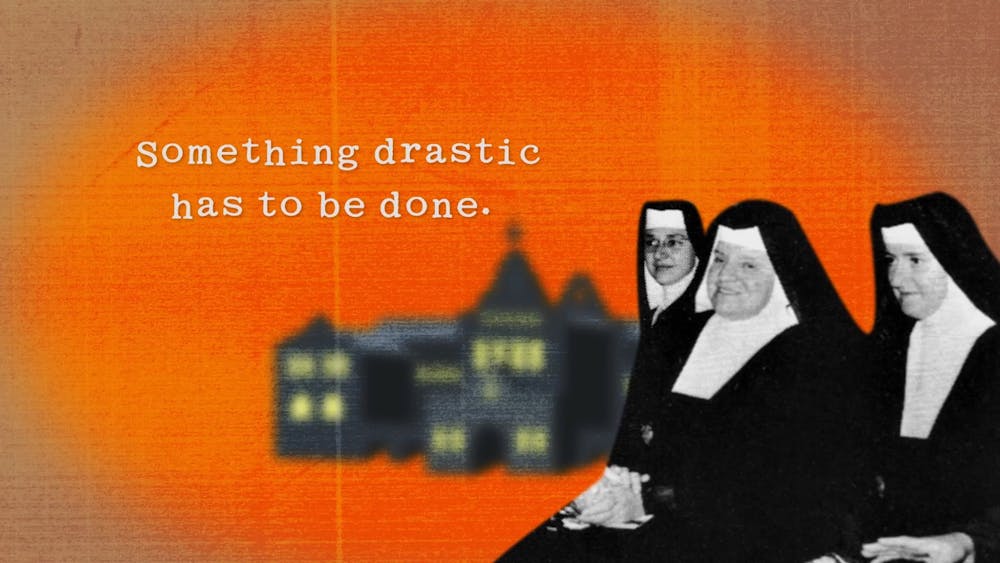From: Silver Screen
Standout documentaries from the AFI DOCS festival

For the first time in a year, the American Film Institute Silver Theater welcomed cinephiles back for the annual AFI DOCS film festival. Festival attendees had the option of virtual and in-person screenings to accommodate the eventual transition to post-pandemic life. I decided to attend in person on premiere night, a choice that proved worthwhile as there was a tangible buzz emanating in the crowd. For many, including myself, this was the first moviegoing experience since before the pandemic.
As I got in line for the concession stand, people eagerly grabbed the pamphlets scattered on tables around us which listed the other documentaries featured and their viewing times. I heard friends exclaim to one another which films they were dying to see and which they thought would be this year’s award winners. Once I had my popcorn, Coca-Cola and Buncha Crunch — a combination I had so dearly missed — I entered the theater to watch “Rebel Hearts” directed by Pedro Kos. Munching on popcorn as the theater lights dimmed, a wave of giddiness swept over me.
“Rebel Hearts” (2021) directed by Pedro Kos
“Rebel Hearts,” a movie about a group of nuns in 1960s Los Angeles, juxtaposes the typical media portrayal of strict and angry nuns in Catholic schools with kind, witty and intellectual women.
The documentary focuses on the women who join the Sisters of the Immaculate Heart of Mary to continue their education. These women form a sprightly community that seeks to reconsider the rules that accompany the patriarchal mold of the church. Within their educational fortitude, they reshape what religious expression looks like and what it means.
The women’s most substantial obstacle proves to be Cardinal James Francis McIntyre, archbishop of LA from 1948 to 1970, who built a considerable number of new churches and schools to propagate his extreme traditionalist reading of Roman Catholic scripture. The changes that accompany Vatican II, however, fuel the Sisters in their mission to restructure the Catholic church and its abuse of nuns.
This film shed light on a misunderstood population. A highlight of the film was its spotlight on artist Corita Kent, whose remolding of religious iconography in her prints challenged McIntyre’s view on religion. Many nuns in this film are finally given their due after decades of defamation.
“Rebel Hearts” is available on stream on Discovery+ now.
“Rise Again: Tulsa and The Red Summer” (2021) directed by Dawn Porter
“Rise Again: Tulsa and the Red Summer,” directed by Dawn Porter, was spectacular both in its relevance to the current political atmosphere and in its exposure of how interconnected different historical moments are.
The film essentially tells us that in many American cities, people are walking over massacre sites without knowing. The violent period of race riots and massacres that affected 26 cities, known as the “Red Summer,” occurred in the summer and fall of 1919, laying the groundwork for the Tulsa Race Massacre in 1921. The film prefaces the events in Tulsa by focusing on a massacre in Elaine, Arkansas, in September 1919. In this massacre, 200 Black residents were killed in a rebuke to their organizing to get better prices for their crops.
The documentary also featured the testimonies of many journalists, and they highlighted how newspapers were often the biggest perpetrators of lies. The most significant takeaway from the film was that it’s dangerous to see these horrific events as isolated instead of representative of a larger mentality.
“Rise Again: Tulsa and the Red Summer” is available to stream on Hulu.
“Luchadoras” (2021) directed by Paola Calvo and Patrick Jasim
The expertly executed “Luchadoras,” directed by Paola Calvo and Patrick Jasim, centers on the lives of four female wrestlers: Lady Candy, Baby Star, Little Star and Mini Sirenita. Set in Juarez, Mexico, femicide and domestic abuse are the backdrops to the lives of these women.
The film opens with a gruesome and vivid scene of assault that serves as an effective stylistic choice to show what circumstances the main characters have grown up with. It also provides the context for why these women have become Luchadoras, or fighters, instead of factory workers — the common occupation of women in their area.
Their lives are marked by violence, and this is framed by the newscasters’ voices and news reports that play constantly in the background. These morbid news stories are juxtaposed against scenes of family, highlighting the ways they resiliently fashion spaces for kinship and joy. Additionally, the women take agency back into their hands amid this abuse with their fighting careers. Although the ring also poses danger, this is violence in their control, and they take pride in their strength.
“Luchadoras” premiered at the South by Southwest Film Festival on March 17, 2021.
“Daughter of a Lost Bird” (2021) directed by Brooke Pepion Swaney
“Daughter of a Lost Bird,” directed by Brooke Pepion Swaney, proved to be my favorite of the festival. The film documents Kendra Potter’s eight-year journey to find her biological mother, April. Potter grew up within white suburbia and knew nothing of her Native ancestry until the week before her 18th birthday.
The film grapples with what being Native means today, especially for people like Kendra and April who are both adopted and only connected with their Native communities later in life. The film deals with the legacy of the residential school system and the abusive welfare state that took so many Native children away from their homes and into white families.
Potter confronts how she is a perfect example of assimilation. “Daughter of a Lost Bird” refutes the notion of the “Vanishing Indian” by giving the viewer a real representation of the way this phrase manifests today and continues to perpetuate harm.
“Daughter of a Lost Bird” premiered at the Human Rights Watch Film Festival on May 27, 2021.
“My Name Is Pauli Murray” (2021) directed by Julie Cohen and Betsy West
For the last night of the festival, I returned to the theater to watch “My Name Is Pauli Murray,” directed by Julie Cohen and Betsy West. It was fitting that the movie premiered in the largest and most prominent theater AFI Silver Spring offered; the film ambitiously challenges the way civil rights is currently remembered through its subject. The theater had an old-fashioned feel with its decorative domed ceiling and many rows of seats. I recommend visiting the AFI theaters if, like me, you have missed the movie-going experience.
“My Name is Pauli Murray” premiered at the Sundance Film Festival on January 31, 2021




